Global AI Career Coach Market Size, Share, Industry Analysis Report By Delivery Model (One-on-One Coaching, Group Coaching, Hybrid Models), By Platform (Mobile Apps, Web-Based Platforms), By Technology (Natural Language Processing (NLP), Machine Learning, Computer Vision, Others), By End Users (Individuals, Educational Institutions, Entrepreneurs, Others), By Regional Analysis, Global Trends and Opportunity, Future Outlook By 2025-2034
- Published date: Oct. 2025
- Report ID: 161450
- Number of Pages: 322
- Format:
-
keyboard_arrow_up
Quick Navigation
- Report Overview
- Top Market Takeaways
- AI in Counseling: Adoption & Access
- Role of Generative AI
- US Market Size
- Emerging Trends
- Growth Factors
- Government Led Investments
- By Delivery Model
- By Platform
- By Technology
- By End Users
- Key Market Segments
- By Platform
- Driver
- Restraint
- Opportunity
- Challenge
- Competitive Analysis
- Recent Developments
- Report Scope
Report Overview
The Global AI Career Coach Market generated USD 4.2 billion in 2024 and is predicted to register growth from USD 5.0 billion in 2025 to about USD 23.5 billion by 2034, recording a CAGR of 18.7% throughout the forecast span. In 2024, North America held a dominan market position, capturing more than a 34.6% share, holding USD 1.4 Billion revenue.
The AI career coach market includes digital platforms and tools that use artificial intelligence to guide users in career planning, skill development, job search strategy, and interview preparation. These solutions analyze user profiles, market trends, job availability, and skill gaps to deliver tailored advice. Adoption spans students, jobseekers, working professionals, and employers offering career support to their workforce.
Growth is supported by rising demand for personalized career guidance, changing job requirements, and workforce transition in areas affected by automation. Many individuals lack access to human career counselors or find traditional services too costly. AI tools deliver continuous support, faster insights, and scalable guidance through chat interfaces, recommendation engines, and assessment tools.
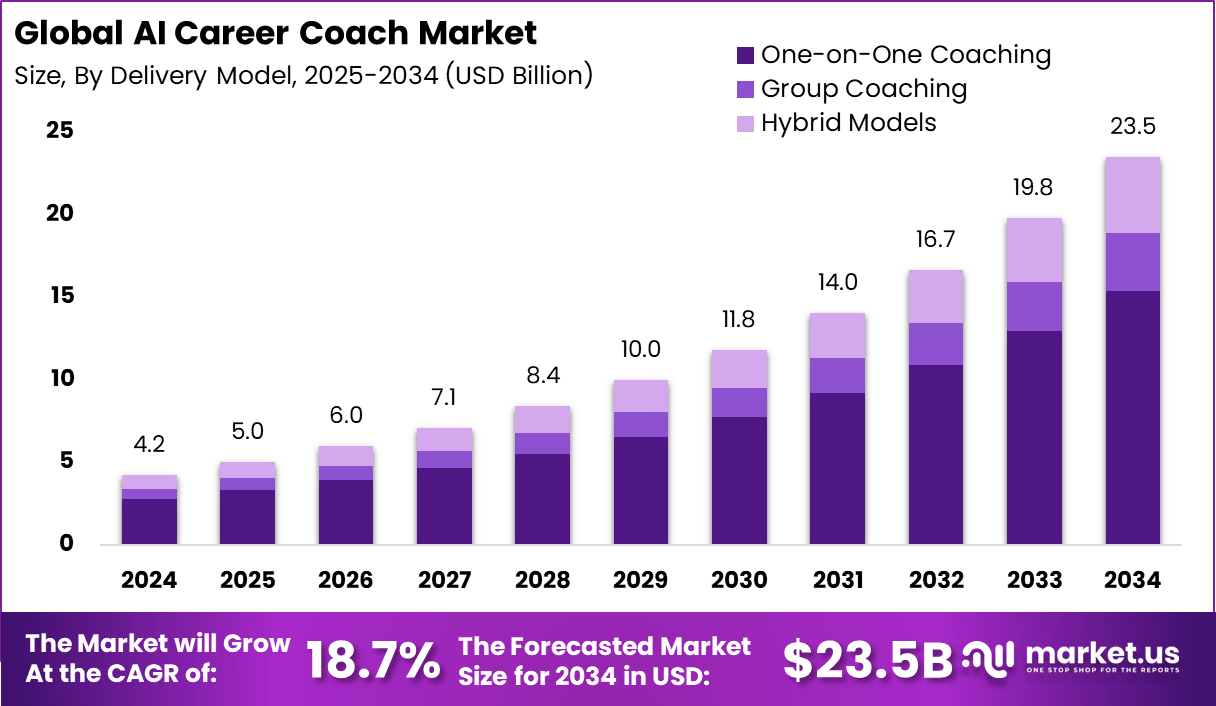
The market is seeing a surge in the use of generative AI, natural language processing, and advanced analytics in career coaching platforms. These technologies automate key tasks such as resume reviews, mock interviews, and personalized learning modules. Integration with corporate HR systems, workflow tools, and online learning platforms is growing, enabling seamless user experiences and ongoing tracking of user skills, progress, and preferences.
Organizations turn to AI coaches mainly to deliver personalized development plans at scale and reduce the costs associated with human-led coaching. Employees benefit from unbiased guidance, instant feedback, and practical skill-development feedback based on current job market realities. For many users, flexibility and around-the-clock availability are decisive advantages compared to the limited schedules of traditional human coaches.
Top Market Takeaways
- One-on-one coaching holds nearly 65.5%, showing that users still prefer personalized guidance over generalized tools.
- Web-based platforms account for about 58.8%, reflecting comfort with browser-based access and flexible usage.
- Natural Language Processing is used in roughly 42.6% of solutions, indicating reliance on conversational and adaptive tech.
- Individuals make up close to 38.9% of end users, showing growing personal interest in AI-driven career support rather than only institutional adoption.
- North America represents around 34.6%, highlighting strong awareness and early uptake of AI coaching tools.
- The U.S. holds a leading share in adoption due to higher digital readiness and career transition activity.
- Growth at about 15.6% CAGR indicates consistent acceptance as users look for tailored career development support through AI.
AI in Counseling: Adoption & Access
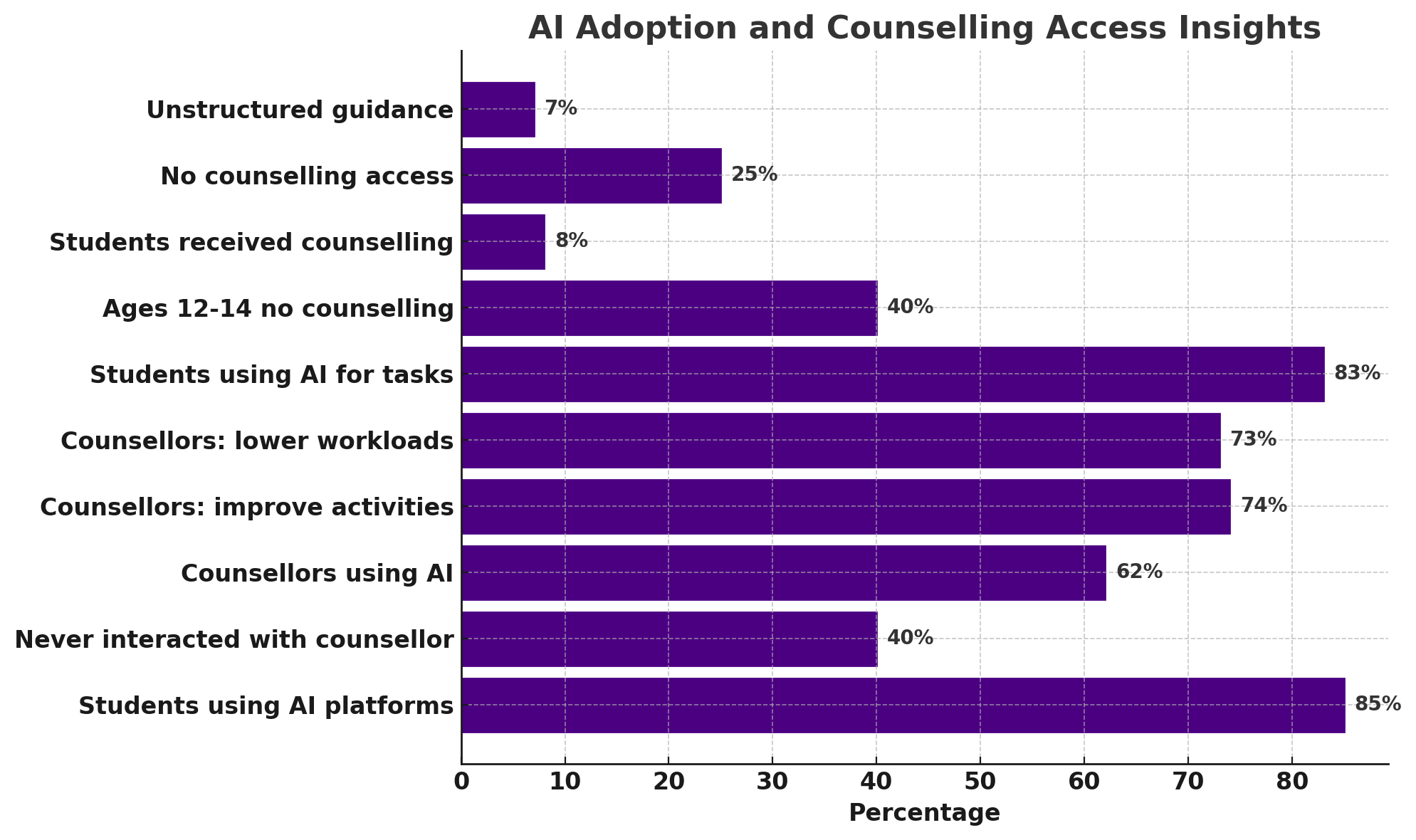
Summary Table
Insights Percentage Students using AI platforms 85% Never interacted with counsellor 40% Counsellors using AI 62% Counsellors: improve activities 74% Counsellors: lower workloads 73% Students using AI for tasks 83% Ages 12–14 no counselling 40% Students received counselling 8% No counselling access 25% Unstructured guidance 7% Role of Generative AI
The integration of generative AI into career coaching is reshaping how people plan and progress in their professional lives. Around 65% of job seekers now use AI tools at some point during their job application process, often to polish resumes, identify roles, and simulate interviews. AI platforms analyze job descriptions and skill sets to generate personalized career recommendations, which enhance employee engagement and support long-term growth.
Generative AI also fuels workplace transformation by automating administrative tasks and guiding career paths with data-backed insights. The rise in AI-enabled tools has led to a significant boost in productivity, with professionals completing tasks faster and with higher quality outcomes. The demand for AI-related expertise continues to expand – global postings for generative AI roles increased nearly 21× since late 2022, showing a structural shift toward AI literacy across all sectors.
US Market Size
The US market is valued at USD 1.24 billion and shows a compound annual growth rate (CAGR) of 15.6%. This impressive growth is driven by a dynamic job market where individuals and organizations seek rapid, data-driven skill development and job transition services. High rates of digital innovation, early adoption of AI in HR, and strong demand for upskilling contribute to the country’s leadership in AI career coaching.
With a vibrant mix of educational institutions, tech companies, and workforce solutions providers, the US continues to set benchmarks for the effective use of coaching technologies. National trends favor AI-powered solutions for their scalability, adaptability, and ability to match career coaching to evolving industry needs.
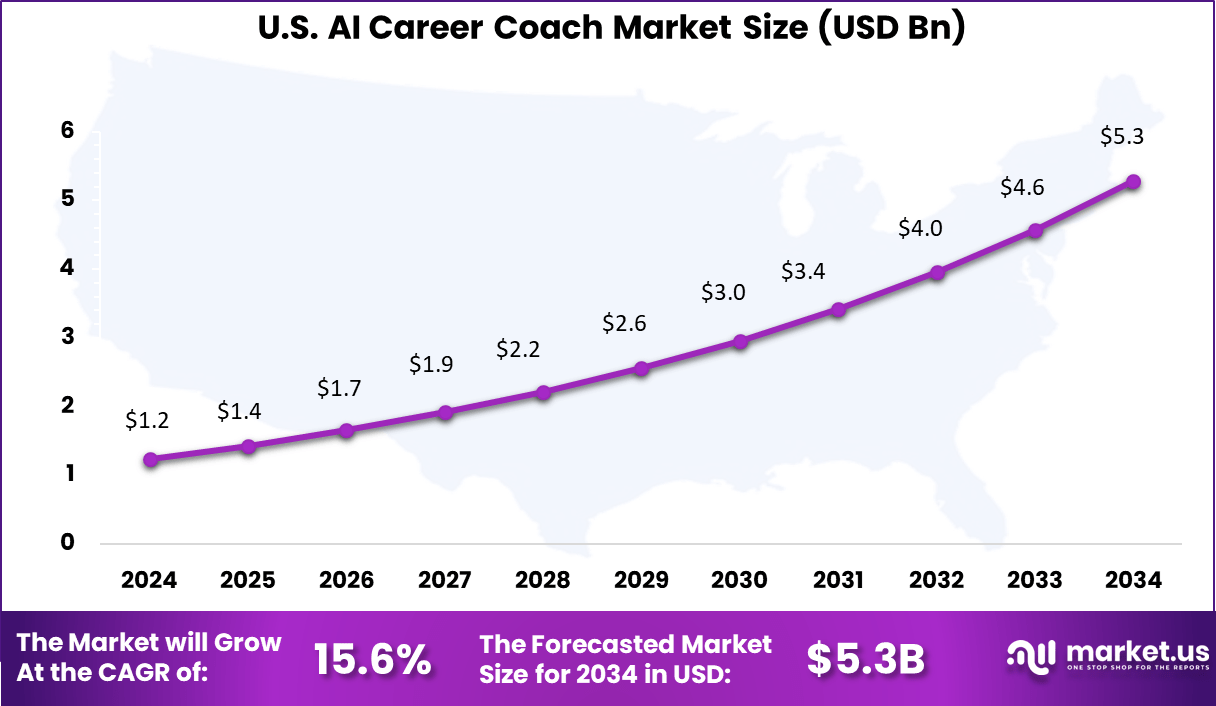
In 2024, North America captures 34.6% of the global AI career coach market. This region stands out for its widespread acceptance of technology-driven learning and coaching solutions, supported by deep integration of AI across educational and corporate settings. Local demand for tailored career guidance has resulted in ongoing growth, with more organizations now prioritizing employee upskilling through digital platforms.
The competitive landscape in North America is shaped by increasing investments in coaching platforms and AI-powered tools that personalize career support at scale. Flexible learning formats, hybrid delivery models, and embedded analytics continue to attract users seeking measurable career progress. This ongoing evolution ensures North America’s leadership role in bridging talent gaps with tech-enabled coaching.
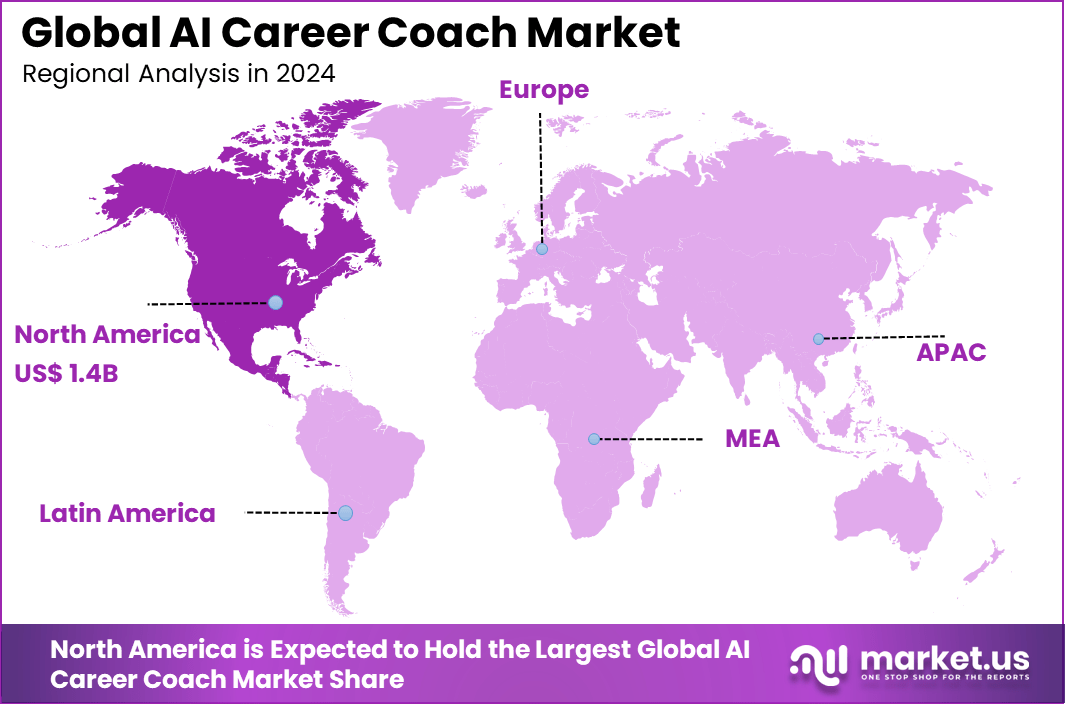
Emerging Trends
Generative AI is rapidly altering job design, creating new roles that did not exist five years ago. Job postings needing generative AI skills have grown nearly 9× since 2022, driven by demand from non-IT sectors including education, marketing, and operations. AI tools are evolving from reactive systems into proactive “career agents” providing continuous feedback and real-time skill assessments.
This development marks a transition from static career planning to interactive and adaptive guidance, where AI evolves alongside each worker’s progress. Education is also responding to these changes. Universities and training centers are adjusting curricula to include AI-driven learning tools that teach applied job skills.
This evolution is reflected in the 220% jump in demand for generative AI modeling and data annotation roles over the past year. Training programs and micro-credentialing are rising globally, ensuring that workers remain employable as AI shifts the nature of work itself.
Growth Factors
One major driver of growth is the widespread adoption of AI across industries. About 78% of organizations use some form of AI in their business operations, and 71% actively integrate generative AI into at least one workflow. This surge is redefining traditional work processes by creating a measurable productivity uplift, as AI allows employees to focus more on strategy and creativity rather than repetitive administration.
The productivity benefits, though modest now, are projected to contribute steadily to total factor productivity over the next decade. Another strong factor is the acceleration of digital transformation initiatives. Companies are embedding AI into HR and learning systems, enabling predictive analytics for career growth and reskilling opportunities.
As workers gain confidence in using these tools, satisfaction and retention rates improve. In 2025, more than 62% of professionals aged 35-44 reported a high level of AI proficiency, showing how quickly digital capability is becoming a standard in career success.
Government Led Investments
Governments are playing an active role in building AI capabilities to support national innovation agendas. India’s “IndiaAI Mission” allocated over ₹10,000 crore to build AI infrastructure, run skilling programs, and strengthen innovation ecosystems.
The creation of Centers of Excellence across healthcare, agriculture, and education aims to connect research, policy, and industry workflows, ensuring that AI works inclusively for every demographic. Public initiatives are not limited to domestic readiness. The launch of the IndiaAI Startups Global program in March 2025 supported 10 startups in expanding into European markets.
More than 18.56 lakh learners have registered on the FutureSkills PRIME platform, and 3.37 lakh have earned AI skill certifications under this scheme. These figures highlight how government funding directly fuels employability by closing the talent gap and supporting sustainable AI-led career pathways.
By Delivery Model
In 2024, One-on-one coaching holds a leading 65.5% share in the AI career coach market. Professionals are increasingly drawn to personalized sessions because they help tailor advice for unique goals, experience levels, and industry requirements. The connection between coach and client creates space for customized action plans and immediate, relevant guidance, which translates to improved confidence and tangible outcomes.
People who use one-on-one AI coaching models report a rise in interview rates and placement satisfaction, a trend supported by real-world data. This approach is associated with higher rates of job placement success, as AI-driven advice quickly pinpoints gaps, suggests targeted learning steps, and simulates mock interviews, making job seekers more competitive in today’s crowded market.
By Platform
In 2024, Web-based platforms account for 58.8% of market adoption in AI-driven career coaching. They provide accessible and affordable solutions that serve users across different regions and time zones. These platforms allow clients to sign in from anywhere, offering smooth digital interaction, automated career profiling, resume advice, and continuous feedback without the constraints of location.
This prevalence is reflected in user experience: nearly 90% of learners report better preparedness for career transitions after using AI-powered web platforms. Web-based solutions have also accelerated the uptake of career coaching among remote workers, students, and people seeking mid-career shifts, as the platforms are easily integrated with job boards and learning resources.
By Technology
In 2024, Natural Language Processing (NLP) is the dominant technology, driving 42.6% of AI career coach solutions. NLP lets users communicate in everyday language, making sessions intuitive and highly interactive. The technology analyzes resumes, job postings, and personal profiles to generate actionable advice, such as practice questions, skills analysis, and application suggestions tailored for specific careers.
Studies show that AI coaching tools using NLP can boost user efficiency during job searches and application processes. For instance, 71% of users experience faster task completion, and those using AI-generated documents often reach a 23% higher interview rate than peers relying on standard templates.
By End Users
In 2024, Individuals constitute 38.9% of the end user segment for AI career coaches. Many people now prefer independent, tech-powered solutions to navigate career transitions and advancements at their own pace. This shift is partly driven by limited access to human mentors and the convenience that AI brings to personal career planning.
Moreover, surveys show that fewer than a fifth of job seekers have ever worked with a human coach, making digital tools the new gateway to personalized help. Early adopters of dedicated AI career platforms report up to 38% higher rates of getting hired compared to non-users, showing the practical impact on real career outcomes.
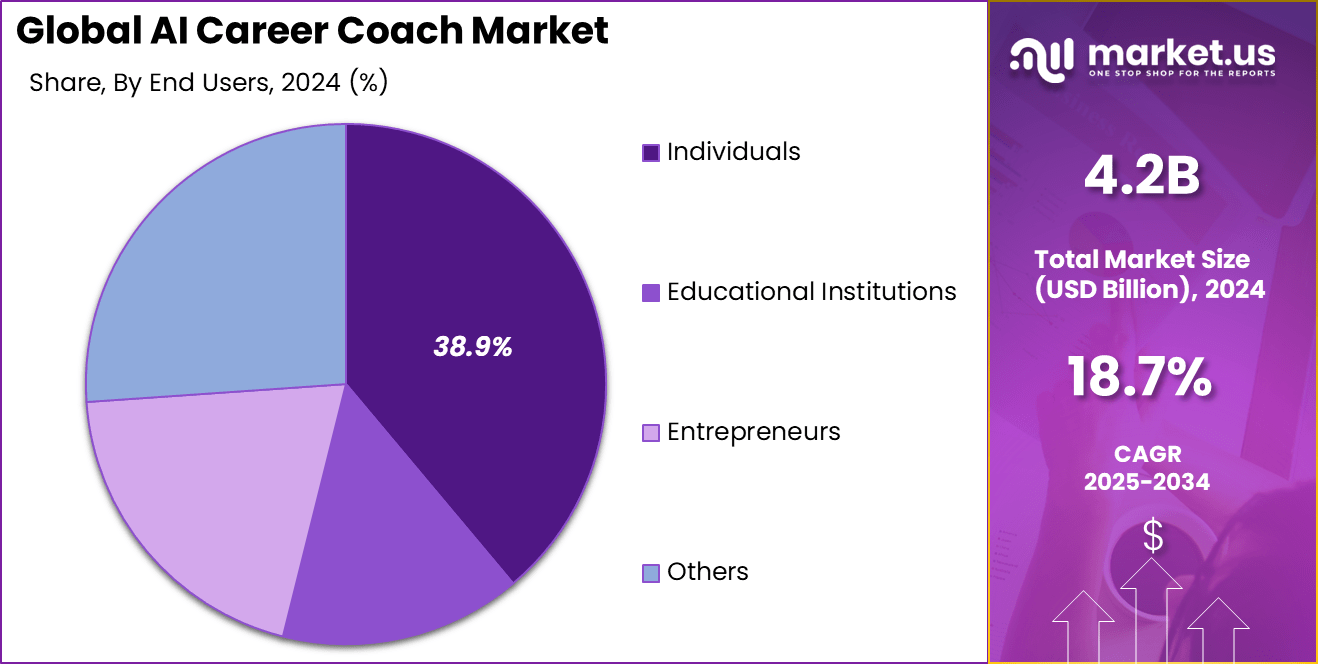
Key Market Segments
By Delivery Model
- One-on-One Coaching
- Group Coaching
- Hybrid Models
By Platform
- Mobile Apps
- Web-Based Platforms
By Technology
- Natural Language Processing (NLP)
- Machine Learning
- Computer Vision
- Others
By End Users
- Individuals
- Educational Institutions
- Entrepreneurs
- Others
Regional Analysis and Coverage
- North America
- US
- Canada
- Europe
- Germany
- France
- The UK
- Spain
- Italy
- Russia
- Netherlands
- Rest of Europe
- Asia Pacific
- China
- Japan
- South Korea
- India
- Australia
- Singapore
- Thailand
- Vietnam
- Rest of Latin America
- Latin America
- Brazil
- Mexico
- Rest of Latin America
- Middle East & Africa
- South Africa
- Saudi Arabia
- UAE
- Rest of MEA
Driver
Rising Demand for Personalized Career Planning
The AI career coach market is gaining momentum due to a strong rise in demand for personalized and data-backed career planning support. AI tools can now analyze individual skills, professional history, and market data to suggest targeted growth paths, bridging the gap between personal ambition and evolving job markets.
With professionals across industries facing rapid changes in required skills, automated insights serve as a crucial support system. Users appreciate quick, relevant feedback on resumes and interviews that helps them position better in competitive markets.
Furthermore, AI-enabled systems support individuals in identifying specific skill gaps and recommending suitable learning resources. This level of personalization is enhancing user satisfaction and efficiency, making such tools more attractive to both employees and employers investing in skill development plans. As a result, AI coaches are becoming integrated components of corporate HR strategies focused on continuous learning and professional growth.
Restraint
Perception as Luxury Service
A significant obstacle for AI career coaching is its perception as a premium or luxury service. Many job seekers still view professional coaching, whether human or AI-based, as an unnecessary cost unless they reach executive roles. This perception narrows the target market and limits expansion into mid-level and entry-level segments where affordability is key.
The issue is more visible in developing markets, where awareness about AI-enabled career tools remains low. Adding to this, the lack of standardization across different providers worsens trust issues. Users often find varying levels of service quality between platforms, making it difficult to measure the return on investment.
The inconsistency can deter potential adopters, especially individuals who expect reliable results before investing in AI-based career advice. To overcome this restraint, market players are focusing on transparent pricing models and demonstrable career outcome data to build user trust.
Opportunity
Scaling Workforce Development Solutions
One strong growth opportunity lies in the use of AI career coaches as corporate development tools. Organizations are integrating AI-driven platforms to scale employee training and career progression initiatives efficiently. Many enterprises recognize the benefit of providing digital coaches that enhance employee engagement and retention while keeping reskilling costs low.
Additionally, AI tools that blend personalized learning recommendations with predictive analytics can help companies design long-term workforce development plans. This synergy between data insights and real-time feedback is transforming talent management approaches. Such models present a massive opportunity for vendors that can offer scalable AI coaches adapted for both individual professionals and large enterprises seeking measurable outcomes.
Challenge
Human Element in Coaching
Despite rapid technological progress, one of the main challenges in this market is balancing automation with the human touch. While AI can efficiently handle analytical and routine tasks, many professionals still prefer human empathy and contextual understanding that algorithms cannot easily replicate.
Career decisions often involve emotion, self-doubt, and motivation – areas that require personalized interpretation beyond data analysis. This gap creates a behavioral barrier to adoption where users engage with AI tools but still rely on human mentors for final decisions.
The challenge, therefore, is not replacing human coaches but augmenting their abilities with AI for better outcomes. Market leaders are now focusing on developing hybrid coaching systems that blend algorithmic insights with limited human interaction, ensuring emotional support while maintaining scalability.
Competitive Analysis
The AI Career Coach Market is gaining traction through platforms such as CareerVillage, FutureFit AI, and Careerflow Inc. These companies use AI-driven guidance tools to help users explore career paths, enhance résumés, and improve job readiness. Their platforms focus on mentorship, upskilling recommendations, and personalized career planning powered by data insights and machine learning models.
Innovative providers including Sapia.ai, Kickresume, JobWinner, and Wonsulting specialize in interview preparation, résumé optimization, and employer matching. These firms integrate natural language processing, predictive analytics, and automated feedback to help job seekers improve hiring outcomes. Their services cater to students, working professionals, and career transition candidates.
Emerging contributors such as nSpire AI, Edumilestones, and VeePN, along with other major players, support the market with tools for career assessments, skill mapping, and global job platform integration. Their offerings enhance user engagement through AI chatbots, multilingual support, and psychometric analysis, driving wider adoption across education, recruitment, and workforce development sectors.
Top Key Players in the Market
- CareerVillage
- Sapia.ai
- Kickresume
- Careerflow Inc.
- FutureFit AI
- JobWinner
- Wonsulting
- nSpire AI
- VeePN
- Edumilestones
- Other Major Players
Recent Developments
- August 2025, Sapia.ai, announced the launch of its Skills Intelligence API, allowing HR systems to embed science-backed talent assessments seamlessly. This developer-focused API enables ethical, scalable hiring by directly measuring candidate skills through conversational AI interviews, validated by a massive dataset of over 7 million interviews.
- August 2024, CareerVillage launched “Coach,” an innovative AI career development tool targeting underrepresented youth and adults. The platform integrates research-backed impact measurement and is deployed through partnerships with mentorship organizations, workforce boards, educational institutions, and nonprofit job-training programs.
Report Scope
Report Features Description Market Value (2024) USD 4.2 Bn Forecast Revenue (2034) USD 23.5 Bn CAGR(2025-2034) 18.7% Base Year for Estimation 2024 Historic Period 2020-2023 Forecast Period 2025-2034 Report Coverage Revenue forecast, AI impact on Market trends, Share Insights, Company ranking, competitive landscape, Recent Developments, Market Dynamics and Emerging Trends Segments Covered By Delivery Model (One-on-One Coaching, Group Coaching, Hybrid Models), By Platform (Mobile Apps, Web-Based Platforms), By Technology (Natural Language Processing (NLP), Machine Learning, Computer Vision, Others), By End Users (Individuals, Educational Institutions, Entrepreneurs, Others) Regional Analysis North America – US, Canada; Europe – Germany, France, The UK, Spain, Italy, Russia, Netherlands, Rest of Europe; Asia Pacific – China, Japan, South Korea, India, New Zealand, Singapore, Thailand, Vietnam, Rest of Latin America; Latin America – Brazil, Mexico, Rest of Latin America; Middle East & Africa – South Africa, Saudi Arabia, UAE, Rest of MEA Competitive Landscape CareerVillage, Sapia.ai, Kickresume, Careerflow Inc., FutureFit AI, JobWinner, Wonsulting, nSpire AI, VeePN, Edumilestones, Other Major Players Customization Scope Customization for segments, region/country-level will be provided. Moreover, additional customization can be done based on the requirements. Purchase Options We have three license to opt for: Single User License, Multi-User License (Up to 5 Users), Corporate Use License (Unlimited User and Printable PDF) 
-
-
- CareerVillage
- Sapia.ai
- Kickresume
- Careerflow Inc.
- FutureFit AI
- JobWinner
- Wonsulting
- nSpire AI
- VeePN
- Edumilestones
- Other Major Players













